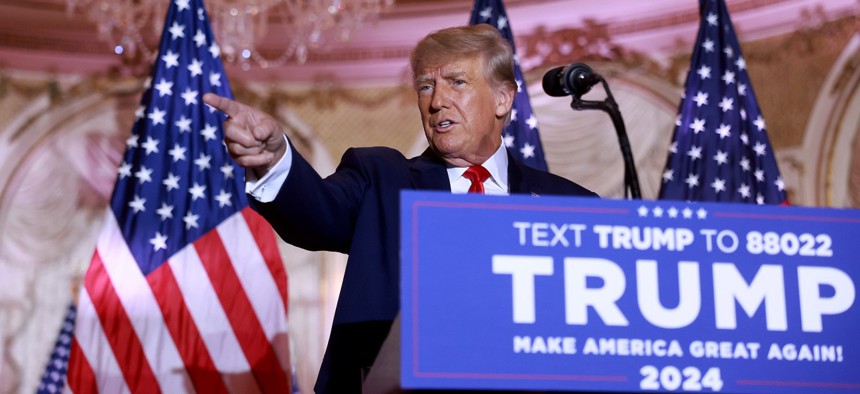
Trump announced Tuesday that he will run for president again in 2024. Joe Raedle/Getty Images
Trump, Who Tried to Weaken Feds' Civil Service Protections, Announces 2024 Run
Prior to Tuesday’s announcement, the former president endorsed plans to reimplement Schedule F if he returned to the White House.
Former President Donald Trump—who supports a plan to make many federal workers at-will employees and as president signed executive orders to make it easier to fire them and to limit the reach of federal unions—on Tuesday announced that he would again seek the Republican nomination for president in 2024 in an hour-long speech at his Mar-a-Lago resort in Florida.
After a tumultuous four years in the White House, Trump was defeated by President Biden in 2020. Trump never accepted the results of the 2020 presidential election, and numerous law enforcement agencies continue to investigate the circumstances of the Jan. 6, 2021 insurrection at the U.S. Capitol in an effort prevent Congress from certifying Biden's victory. Trump himself remains under investigation for failing to turn over a cadre of classified documents that were improperly stored at his Florida home.
“Two years ago, we were a great nation,” Trump said Tuesday. “And soon we will be a great nation again. The decline of America is being forced upon us by Biden and the radical left lunatics running our government right into the ground.”
Trump’s term as president was a difficult one for the federal workforce. A series of now-rescinded executive orders sought to make it easier to fire federal employees and reduce the role of unions at federal agencies, and his administration tried unsuccessfully to disband the Office of Personnel Management and send its functions to the General Services Administration and the Executive Office of the President.
Shortly before the 2020 election, Trump established a new job classification—Schedule F—within the excepted service and tasked agencies with finding federal workers in “policy-related” positions to reclassify into the new category. Had Biden not taken office in January 2021 and quickly axed the plan, tens of thousands of federal workers could have effectively become at-will employees.
During the first two years of the Biden administration, many of Trump’s federal workforce policies have been revoked, but conservative activists have continued to work behind the scenes, laying the groundwork to revive those plans in the event Trump or another Republican returns to the White House. Last summer, Axios reported that some conservative groups are working to have Schedule F ready to implement immediately upon a Republican’s inauguration, and have identified 50,000 federal workers to reclassify and threaten with firing.
Trump himself endorsed the plan to revive Schedule F and purge the civil service of so-called “rogue bureaucrats” at a rally earlier this year and began fundraising on the proposal shortly thereafter.
“We need to make it much easier to fire rogue bureaucrats who are deliberately undermining democracy or, at a minimum, just want to keep their jobs,” Trump said in July. “They want to hold onto their jobs. Congress should pass historic reforms empowering the president to ensure that any bureaucrat who is corrupt, incompetent or unnecessary for the job can be told—did you ever hear this—‘You’re fired, get out, you’re fired.’ [You] have to do it. Deep state. Washington will be an entirely different place.”
However, the threat of politicizing the federal workforce is not unique to Trump. Since the presidential transition, Republican lawmakers have begun to embrace Schedule F, opposing Democratic efforts to require congressional authorization before a president institutes a new job classification in the excepted service, and others have introduced legislation that would make federal workers at-will employees.
With the House likely to flip to Republican control in 2023, the window for lawmakers to pass a law preventing the return of Schedule F is closing. But Senate Democrats told Government Executive in recent weeks that they are optimistic that they will be able to include the measure as part of either the annual National Defense Authorization Act or an omnibus spending package to fund the government through next September.







